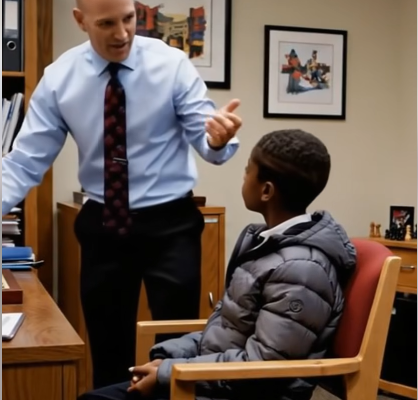I received the call during second period.
“Can you come down? We’ve got a student refusing to remove his cap.”
Our school has a strict no-hats rule. It always has. But something in the teacher’s tone made me pause.
When I arrived at my office, there he was. Jaden. Eighth grader. Usually quiet, respectful. Today? Slouched deeply in the chair, arms crossed, cap pulled so low I could barely see his eyes.
I sat across from him and inquired, “What’s happening, man?”
No response.
I tried again. “You know the rule. Do you want to help me understand what’s going on?”
After a long pause, he muttered, “They laughed at me.”
I leaned in. “Who did?”
“Everyone. At lunch. They said I looked like someone took a lawnmower to my head.”
I asked if I could see it.
He hesitated. Then slowly, carefully, pulled off the cap.
And yes… it was rough. Uneven lines. Patches missing. Someone clearly attempted to fix it and abandoned the effort midway.
I could have written him up. Sent him home. But the way his shoulders curled inward, as if he desired to vanish—I knew that was not what he needed.
So I retrieved my clippers.
You see, before I became a principal, I cut hair on the side to help with college bills. I still keep my kit in the office. A habit.
“Let me fix you up,” I stated.
He blinked. “Can you do that?”
“Better than whoever did this.”
He laughed—nervously—but nodded.
As I shaped his hair, he began to speak more. About how kids would not desist. About how he simply wished to feel normal.
By the time I was about to finish, I observed scars on his head—
Faint, yet visible. A thin, long one near his left temple. Another at the crown. I did not remark initially; I simply adjusted the clippers gently and continued my work.
“Have you been in an accident?” I asked casually, attempting not to make him self-conscious.
He fell silent.
Then he mumbled, “My mom’s boyfriend threw a glass bottle at me when I was seven. I needed stitches.”
I froze for a second. Not because I had not heard such accounts before—but because of his casual delivery. As if he did not expect anyone to care.
“Jaden… does that still occur?”
He shrugged. “Not truly. He’s departed now. My uncle is present, but he does not do much.”
I nodded and completed the cut, brushing off his shoulders. “You look sharp, man.”
He glanced at himself in the mirror I handed him. He smiled faintly. “Thanks.”
But the scars remained in my thoughts.
That evening, I reviewed his records. Jaden had missed many days last year. He had changed schools twice before joining us. Notes from previous counselors were present, but nothing concrete. Only words like “quiet,” “withdrawn,” “potential home instability.”
I resolved to check in more frequently.
The next week, I found excuses to see him—hall passes, lunch duty, even catching him before homeroom. He would smile now, sometimes utter “what’s up.” But there was always a guardedness, as if he awaited the next negative event.
One day after school, he stopped by my office voluntarily.
“Uh… do you possess any of that gel? The kind that smells pleasant?”
I handed him a small container from my drawer. “Attempting to impress someone?”
He blushed. “No. I simply desire to look presentable.”
“Nothing wrong with that.”
He lingered for a few more minutes, tapping the edge of my desk. Then, unexpectedly, he stated, “Have you ever been ashamed to return home?”
The manner in which he spoke—flat, almost like a test—affected me profoundly.
I thought for a second before responding. “Yes. When I was your age, some nights I stayed at the park until it grew dark simply to avoid returning.”
His eyes widened. “Why?”
“My mom drank excessively. And her boyfriend was prone to shouting. Sometimes throwing objects. I used to sleep with headphones to drown them out.”
He nodded slowly, as if processing the words.
“The same,” he stated quietly.
That was when I knew he was not solely dealing with bullying. This was deeper.
Over the next few weeks, I involved our school counselor, Miss Raymond. She possessed a unique rapport with children—never intrusive, simply present. Jaden began meeting with her every Thursday.
One morning, she stopped me in the hallway. “He recounted the scars. About the individual who used to inflict harm. He trusts you.”
That resonated with me more powerfully than anticipated.
But the true turning point came about a month later.
I was walking to my car when I saw Jaden seated on the curb with a duffel bag. His hoodie was pulled tight, and his face appeared different. Tired. Bruised.
“Jaden?”
He stood quickly, attempting to turn away.
I approached. “What happened?”
His voice cracked. “Uncle became angry. Said I left the milk out. Pushed me into the wall.”
My heart dropped. “Did you contact anyone?”
“No. I simply departed. I was uncertain where else to go.”
I opened my car door. “Enter.”
He hesitated. “Am I in trouble?”
“Not at all.”
I called CPS and explained the situation. They dispatched someone within the hour. Due to previous reports from other schools, they expedited a placement.
What I did not expect? Miss Raymond stepping forward and offering to foster him temporarily.
“I possess the space,” she stated. “And the compassion.”
That night, Jaden texted me from her guest room.
“Thanks for not sending me back.”
I stared at the message for an extended period before replying, “You deserve safety. Always.”
School transformed for Jaden thereafter.
He walked with greater confidence. He began assisting other students with their classwork. He even joined the track team. And yes, he maintained his sharp haircut—visiting every other Friday for a trim and a brief conversation.
But the best moment came during the spring assembly.
Each grade nominated an individual for the “Kindness Counts” award. Jaden won for the eighth grade.
When his name was announced, the applause was thunderous. He stood, stunned. Walked to the stage and stated, “I used to conceal myself under my hat. Now I do not have to.”
Everyone applauded. I shed tears.
Afterward, one of the teachers leaned over to me and whispered, “I did not know his story. But now I comprehend.”
That summer, Jaden was officially placed with Miss Raymond. Permanently. She even initiated the adoption process.
On the last day of school, he brought me a small gift. A cap—clean, navy blue, with the school’s initials stitched in gold.
“I thought you could display it in your office,” he stated, grinning.
I smiled. “You know we have a no-hats rule, don’t you?”
He laughed. “Yes, yes. But I presumed perhaps one exception.”
I hung it directly above my desk.
Because that cap? It reminded me that sometimes rules require compassion. That what appears as defiance is often merely a plea for assistance. And that one haircut, one conversation, one person showing up can alter the trajectory of someone’s life.
Jaden taught me that.
So if you ever encounter a child clinging tightly to something—a cap, a silence, a narrative—do not hastily remove it. Engage with them. Pose a second question. Remain long enough to hear the genuine response.
You might be the individual who helps them feel acknowledged again.
If this story touched you, share it. Perhaps someone needs to hear the reminder that every child merits a safe place—and occasionally, it begins with a haircut.



